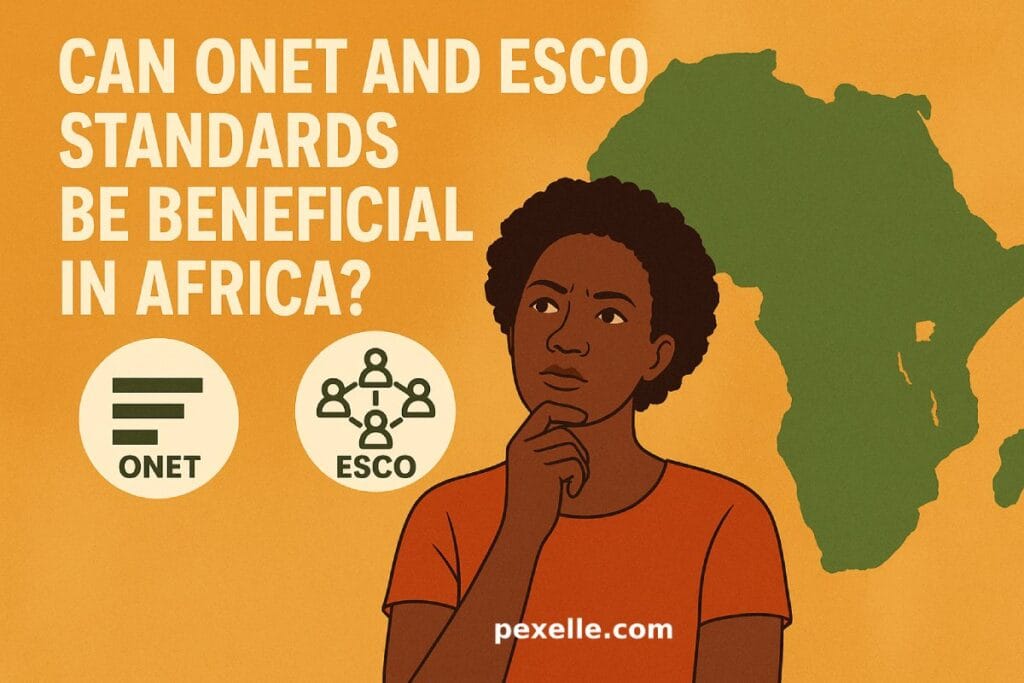Can ONET and ESCO Standards Be Beneficial in Africa?

In the pursuit of inclusive, demand-driven skills development across Africa, aligning national frameworks with international standards such as O*NET (Occupational Information Network) and ESCO (European Skills, Competences, Qualifications and Occupations) is increasingly seen as a strategic move. Both systems offer structured taxonomies for understanding the labor market, mapping competencies, and designing curricula. But how applicable are these tools within the complex and diverse socio-economic landscape of Africa?
Understanding ONET and ESCO
O*NET, developed by the U.S. Department of Labor, provides a comprehensive database of occupational information, including job descriptions, required skills, knowledge domains, and work context. It’s widely used in career guidance, workforce planning, and HR analytics.
ESCO, initiated by the European Commission, similarly categorizes occupations, skills, and qualifications across EU member states. It aims to enhance mobility, recognition of competencies, and the integration of labor market and education systems.
Both frameworks share the goal of standardization, transparency, and interoperability. However, applying them to Africa requires contextual sensitivity.
Benefits for Africa
1. Bridging Skills Gaps
Africa faces high unemployment, especially among youth, not due to a lack of jobs but due to a skills mismatch. ONET and ESCO can offer structured tools to identify the exact skill sets needed for specific roles in industry, agriculture, ICT, or services. This allows technical and vocational education and training (TVET) institutions to align their curricula with market demands.
2. Regional and Global Mobility
As part of the African Continental Free Trade Area (AfCFTA) agenda, there is a push for labor mobility across borders. Harmonizing African occupational frameworks with ONET and ESCO can facilitate mutual recognition of qualifications and ease cross-country job placement.
3. Curriculum Development
Ministries of education and training agencies can use ONET/ESCO to design modular, competency-based programs. By referencing internationally benchmarked standards, African curricula can be modernized to reflect emerging sectors like green jobs, digital technology, and renewable energy.
4. Data-Driven Workforce Planning
National Skills Authorities and Labour Ministries can leverage these frameworks to collect and analyze data on job demand, skill shortages, and sectoral trends. This is essential for evidence-based policy and national human capital strategies.
Challenges and Limitations
Despite the advantages, blind adoption of these frameworks may lead to misalignment with local realities. Many African economies include a significant informal sector, subsistence agriculture, and non-standard occupations that are not adequately represented in ONET or ESCO. Moreover, language barriers, digital infrastructure gaps, and institutional capacity constraints may hinder widespread implementation.
Localization is key. Countries must adapt these taxonomies to reflect indigenous occupations, cultural practices, and labor market characteristics. For example, community-based roles, artisan crafts, or agro-pastoral occupations may need to be custom-mapped using national data and consultations.
Successful African Use Cases
- South Africa: Through its National Qualifications Framework (NQF), South Africa has made efforts to map local job roles with global standards, using ESCO for skills classification in ICT and engineering.
- Ghana and Kenya: Pilot projects in TVET reform have incorporated O*NET data to define industry-relevant competencies, especially in manufacturing and healthcare.
- African Skills Portal (ASPYEE): An AUDA-NEPAD initiative that integrates elements from ONET and ESCO to support workforce development across the continent, particularly in alignment with Agenda 2063.
Conclusion
📌 ONET and ESCO offer powerful, globally recognized standards for organizing skills and occupations. For Africa, their value lies not in direct adoption, but in informed adaptation.
By contextualizing these frameworks within Africa’s unique labor landscape and integrating them with local knowledge, they can play a transformative role in closing the skills gap, improving education quality, and enabling regional economic integration.
African governments, regional bodies, and development partners must collaborate to co-develop hybrid models—internationally aligned yet locally rooted. Only then can these standards fulfill their promise of equitable, sustainable development across the continent.
Source: Medium.com




